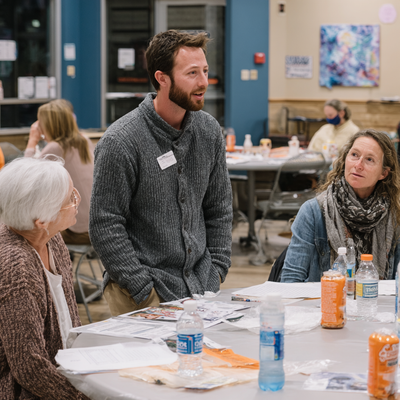Okay so last Sunday this new volunteer walks in. Sweet lady, super eager. I'm thinking great, finally some help with the preschoolers. Five minutes later she's standing in the middle of craft chaos looking like she might cry.
That's when it hit me. I never actually told her anything useful.
You know how it is. You're so desperate for help that when someone shows up you just throw them in and hope for the best. But then you spend the whole morning running damage control instead of actually teaching kids about Jesus.
Been there way too many times.
Don't Wait Until Sunday
Here's what I learned the hard way - start training before they set foot in your classroom.
Remember Sarah? She volunteered to help with our 3rd graders and I figured I'd just explain things when she got there. Except Sunday morning hit and suddenly I'm trying to teach Noah's ark while also explaining why we don't let kids use real scissors and where we keep the extra goldfish crackers when someone inevitably spills the first bag.
Sarah just followed me around looking confused. Pretty sure she thought I was having some kind of breakdown.
Now I meet new volunteers for coffee first. Nothing fancy - sometimes it's just a phone call while I'm driving to pick up my own kids. But I cover the basics:
What age group. What time they need to be there. That Marcus always asks to go to the bathroom during the Bible story and yes, someone needs to walk him there.
Takes maybe twenty minutes. Saves hours of confusion later.
The Buddy System Is Your Friend
Pair them up with someone who knows what they're doing. I call it shadowing but really it's just common sense.
When Jake started helping he worked with Maria for about a month. She showed him how to redirect the wiggly kids during story time. How to handle it when someone has a meltdown over the red crayon being broken. Where we hide the good tape that actually sticks to things.
By week four Jake was running his own small group. The kids already knew him and he wasn't freaking out every time something went sideways.
Plus Maria said it helped her too. Something about explaining what she was doing made her more intentional about it. Win-win.
Start Small For Real
Don't overwhelm them on day one. I made this mistake with Jennifer. Spent like twenty minutes explaining our behavior management system and how we handle parent questions and what to do if someone gets hurt.
Her eyes completely glazed over.
Now I start simple:
- Help kids find their seats
- Pass out supplies
- Wipe down tables after snack
- Stand near the wiggly kids during story time
That's it. The deeper stuff can wait until they're not just trying to remember everyone's names.
And you know what? Some volunteers are perfectly happy staying with the simple stuff. Not everyone wants to lead a discussion about David and Goliath. Some people just want to help kids open juice boxes without making a mess. That's fine too.
Talk About the Weird Stuff Early
Nobody wants to discuss what happens when a kid has an accident. Or throws up. Or has a complete meltdown because they didn't get the purple marker.
But you have to.
I keep a laminated sheet with the important stuff:
- We do side hugs only
- Two adults in the bathroom area always
- Get a leader if there's blood, vomit, or tears that won't stop
- Parents pick up at the dutch door, kids don't go into the hallway alone
Sounds basic but you'd be surprised how many people freeze up when a 5-year-old starts crying because their craft doesn't look like the example.
Give Them Actual Tools
Make a simple cheat sheet. Names of the regular kids. Classroom rules. Where stuff is located.
I tape mine inside my supply cabinet. New volunteers always know where to find it.
Also put snacks and where the coffee is. Trust me on the coffee thing.
Find Great Resources
People always ask what kids ministry curriculum we use. Be honest about your approach.
We use a mix of stuff. Some Grow Curriculum. Some Lifeway. Sometimes I find something random on Kids Sunday School Place that looks good. Sometimes I just wing it with flannel board stories my mom used in the 80s.
Whatever works.
But here's the thing - it doesn't matter how good your Children's Ministry Curriculum is if volunteers don't know how to use it. Walk them through it. Show them the leader guide. Explain how you typically do things.
Some people need structure. Others are fine improvising. Neither is wrong but knowing what to expect helps everyone.
Explain Your Random Rules
Every ministry has weird quirks that make sense to you but confuse everyone else.
Like how we always line up boys first because otherwise the girls take forever. Or how we keep the real scissors locked up because they disappear. Or how Tommy's mom needs a daily report because he's working on honesty at home.
Just tell them. It's not complicated but these little things can make someone feel like an outsider if they don't know.
Actually Check In Later
After a few weeks ask how it's going. Real questions though:
- What felt overwhelming?
- What confused you?
- What almost made you want to quit?
Jessica told me after a month that craft time stressed her out because she never knew where supplies were. Easy fix - just needed to show her my organization system. But I wouldn't have known if I hadn't asked.
David said he felt useless during worship because he didn't know if he should sing or help manage kids. Another easy thing to clarify.
These conversations take maybe ten minutes but they're so worth it. People want to do well. They just need to know how.
When Things Go Wrong
They will. Accept it now.
I once had a volunteer accidentally put paint on a kid's fancy dress. The mom was not happy. Instead of panicking we figured out a better system for protecting clothes during art time.
Don't freak out when stuff happens. Talk through what went wrong and how to handle it next time. Most volunteers actually appreciate the honesty and want to improve.
Plus if you lose it every time something goes sideways people stop telling you when things go wrong. That's way worse.
Parents Are Tricky
New volunteers get nervous about talking to parents. Can't blame them. Some parents are... a lot.
Give them a heads up about pickup dynamics. Who runs late every week. Which parents want a full report. Who you need to flag down about their kid's behavior.
Teach them the magic phrase: "Let me grab [your name] to talk about that." Gets them out of conversations they're not ready for yet.
Some People Need Time
Not everyone jumps right in. That's normal.
Mark barely talked for his first month with our 2nd graders. I worried maybe kids ministry wasn't his thing. Turns out he was just watching. Learning the kids' personalities. Figuring out the flow.
By month three he was one of our best small group leaders.
People process differently. Give them space to find their rhythm.
Think Long Term
You're not just training someone for this Sunday. You're hopefully developing a ministry partner for years.
Some of my best volunteers started as nervous first-timers who almost bailed after week two.
Take time to invest in them properly. It pays off when you have a team of people who actually know what they're doing and feel confident doing it.
Good volunteers are hard to find. But they're even harder to keep if you don't set them up for success from the start.
Training people well isn't just about making your life easier. Though it definitely does that. It's about creating a place where kids are safe and loved by adults who feel equipped to care for them well.
When volunteers feel prepared and supported they stick around. That's worth every minute you invest upfront.








